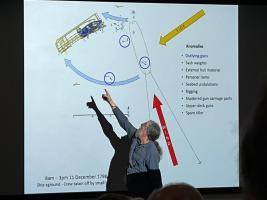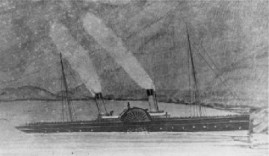Advanced diver
Want to manage and supervise adventurous and challenging diving expeditions and activities?
As a BSAC Advanced Diver you are a highly qualified branch diver. This course is for divers who are interested in extending still further their skills in planning and supervising diving groups,
rescue management skills, whilst building seamanship and developing further leadership qualities.
The BSAC Advanced Diver course develops knowledge and skills. Divers gain experience in planning dives at different sites and circumstances. Additional skills will be gained in using small boats,
chartwork and navigation and many other related skills. Advanced Divers who are Open Water Instructors are eligible to progress to Advanced Instructor.
Prerequisites
To enrol on the BSAC Advanced Course you must be 14 years or older. You must have already successfully completed a BSAC Dive Leader course (or qualifying certification from another recognised
training agency).
What you’ll learn
You will learn dive planning and managment skills through four classroom lessons, two open water lessons, two dry practical lessons and 20 dives (which may include the open water lessons) in a range
of conditions, since qualifying as a Dive Leader.
• The BSAC Advanced Diver course covers:
• The role of the BSAC Advanced Diver
• Advanced diving
• Organising diving from different platforms
• Review of diving conditions and on-site first aid
• Expedition planning
• Diving and rescue skills review
• Rescue skills and management review
• Dive planning and management
The BSAC Advanced Diver course has relatively few ‘formal’ practical lessons and is much more heavily based on a structured broadening of experience, particularly dive management.
Experience dives
The BSAC Advanced Diver syllabus includes open water lessons and experience dives which should total a minimum of 20 dives and 600 minutes underwater time since qualifying as a Dive Leader. To ensure
that students receive experience in a range of conditions, the open water dives must include the conditions in the following list. To ensure consolidation of the skill requirements, each of the
conditions should be experienced on at least three dives:
• planned decompression dive - dive involving at least two planned decompression stops
• dive in tidal waters - dive involving a direct descent following a shot line, to dive on a specific site in a slack water window.
• drift dive - dive to a minimum depth of 15m in water moving at a speed which precludes a return to the point of entry
Only one of the above conditions may be logged per dive. In addition to the above, a further six dives should include at least three of the following conditions:
• navigation dive - dive requiring navigation around a site.
• search dive - a dive involving the utilisation of underwater search techniques.
• no clear surface dive - a dive involving no clear surface, either cavern, wreck penetration or ice diving.
• mixed gas dive - a dive involving use of mixed gas, either closed circuit rebreather or open circuit.
• advanced decompression dive - a dive involving advanced decompression techniques and emergency gas deployment using decompression trapeze or lazy shot.
• surface location dive - a dive involving the surface location of an unknown site using surface searching techniques, followed by suitable precautions when diving an unknown site.
Of the 20 dives:
• at least ten should be carried out from boats.
• on at least ten the student should act as dive leader
• at least six should show depth experience greater than 30m
• on at least five occasions the student should act as Dive Manager (including taking responsibility for carrying out all planning activities):
• at least two should be full day diving activities, to sites which are unknown to the student Dive Manager
• at least one should be for a duration of at least two days, involving overall planning of the event
• the remaining two may be to either known or unknown sites
Qualification and what that means
A BSAC Advanced Diver is defined as a diver who is comprehensively trained, experienced and responsible and who can manage and supervise:
• a wide range of adventurous and challenging diving activities
• branch diving expeditions to explore unfamiliar locations
• branch diving activities including dives utilising developing technology and techniques
While Advanced Divers do not necessarily need to be qualified to use emerging technologies themselves, they need to know sufficient about them to understand how to safely incorporate them within
branch diving.
Learning materials
When you sign up for the course with NDsac you will be provided a pack as part of your course which includes all the learning materials you need for the BSAC ….. course. The pack includes: Qualification Card application and an A5 binder with your Student Diver Notes.
Required gear
Full diving equipment.
Recommended gear
At this stage in your diving development you will almost certainly already own your own diving equipment. We would also recommend some other items (if you don’t have them already) including:
The Expedition Manual (highly recommended)
Navigation and seamanship products
Diver safety products
Dive Guide books
News
NDSAC AGM 2024
Compressor News 2024
The compressor is available for both air and Nitrox. Contact committee members for details.
CLUB News
MORE ON THE COLOSSUS
Latest news on the archeological findings on the wreck of the 74gun warship HMS Colossus - position first located in modern times by NDSac club members (2001) - Details on the website Blog
page
Club Projects
NDSAC Ferry Bridge Project
In response to BSAC's interest in club projects, it has been suggested to the committee that Ferry Bridge Diving could provide us with an all season project on marine life, photography and local history. A project outline has been registered with BSAC as a Club Conservation Project.
Click above to see details on our new NDSAC Projects Page
NDSAC Adopted Wreck.
Want to join us?
If you'd like to become a member, or to find out more, please use equiries or call in to see us or simply use the form on our contact us page

